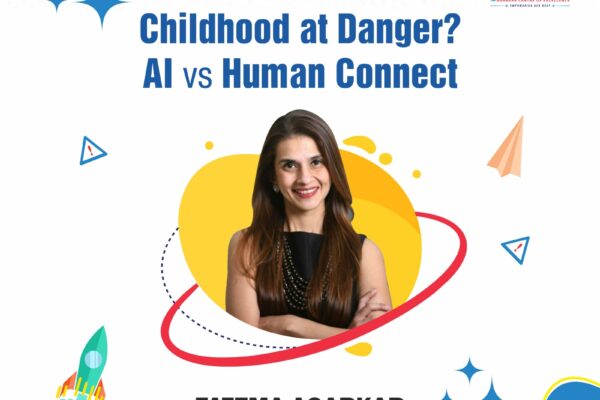The National Education Policy (NEP) has dedicated a fair amount of importance to the role of teachers when envisioning how the future of this great nation will be defined, and positioning India as an education super power in the years to come. Detailed paragraphs about Teacher Education, Recruitment & Continuous Development was a highlight for me in the policy. For those of us who have been passionately and transparently speaking about this during conferences, it is indeed heartening to note that the policy admits the quality gaps that exist which eventually leads to the inability to deliver on learning outcomes. I do understand global models were researched extensively to identify salient features that have worked and the proposition to implement these ‘time tested’ ideas will directly impact how the children learn in India – well that’s the vision anyway.
Let’s pause here. Research is great when it brings in an international or fresh perspective. It’s what we will do to customise and ‘localise’ it is the key. Given our demographics, we need to be mindful of minimum requirements and ‘blanket’ protocols proposed by States, and also the focus should be on ‘conversions’. Conversions are nothing but creating employment opportunities for those who are pursing bachelor’s degrees in other disciplines and inspiring them to move to education. This is the real transformation I would like to see. Kind of like what Teach for America was modelled on! It must be about attracting the best in class talent to teach, to ‘upgrade’ what exists in terms of performance. I am not for a moment suggesting those pursuing teacher education are not passionate or talented. But it would be interesting to research the profile of those enrolling. There will be some hard truths to be accepted, and when we do that we will realise, the root cause problems will not go away unless we address them. I strongly believe that we need to make education an attractive proposition (it has briefly been touched upon in the policy document), as glamorous as architecture, medicine, law, banking, finance and FMCJ. It must also be noted that private sector continues to lead trends with employment because of better systems and career progression path, but there are serious concerns about the ‘content’ taught in these degree programs and therefore ‘who’ schools are required to hire into their schools, given State mandates. There is a definite need for teachers with subject matter expertise and language efficiency, and both these perhaps are not at the point we would hope them to be at.
This is a reality, and many decades later we are still discussing it, having made very little course correction. Perhaps now is the time?
So back to the policy propositions -there are variation models proposed for these professional qualifications from short term to 1, 2, 4 year BED Courses recognising that there is a need to customise and focus on modern teaching-learning, and real life experience as part of the journey. Get that, but what will be interesting is who shapes the content that is ‘modern’. Who defines what should be part of the curriculum at higher education? Onus on national and private colleges? Are they ready to ring in the changes?
With the NEP, I also see the emergence of many committees to decentralise decision making (?!) and therefore if there has to be a committee constituted for learning outcomes which is proposed in the Higher Education governance regulatory body with its 4 verticals, I hope senior educators from K-12 can contribute to shape content at the University level especially for teacher education. They know what functional levels work in their schools, and they must therefore have a say in framing guidelines to teach.
As far as recruitment is concerned, we have got to professionalise this process as it is in the private sector with a focus on overall personality, attitude, subject matter expertise, work experience, exposure and ‘fit’. Private sector practices must be brought in for they work. This is a critical component as the fit to an organisation is an important starting point.
Professional development is a much disputed and debated topic, and I hope regulatory bodies focused on this, emphasise accredited and qualified trainers delivering this mandate for schools. Schools, as advised in the policy must be empowered to do it need based and not some compulsory mandates that has simply no purpose (50 hours must be meaningfully spent and impact an improvement). This piece is critical as continuous professional development separates the good from the ordinary and this cannot be mandated, it must be basis of audit and evaluations that schools decide which internal or external source can cater to their needs.
Teacher evaluations are a welcome sign as well, but once again a committee being commissioned to create these ‘parameters’ needS to be from the current industry, those practicing and working directly with teachers and I often find that Quality Control is never empathetic to the needs of the time, and detached from the teaching learning practices causes challenges for what is audited is usually not reflective of the effort put in. Also complexity of the models proposed previously works for extensive research but from a problem solving space, I urge decision makers to make it frequent but simple and positioned to effect qualitative improvements not basis of salary increments.
As educators have been sharing, the NEP uplifts the spirit and gives everyone the hope and direction that ideas that are futuristic will help shape young minds and ensure that they are employable and can compete with the best in class when they graduate. Yet, it comes down to the regulations and how States will adapt and implement. Who defines and regularises the content at universities, what type of internships models are put in place and the entire duration of implementation. Well, there is clear intent, there now must be substantial work done to ‘operationalise’ being mindful of our demographics.
It will boil down to the micro!












